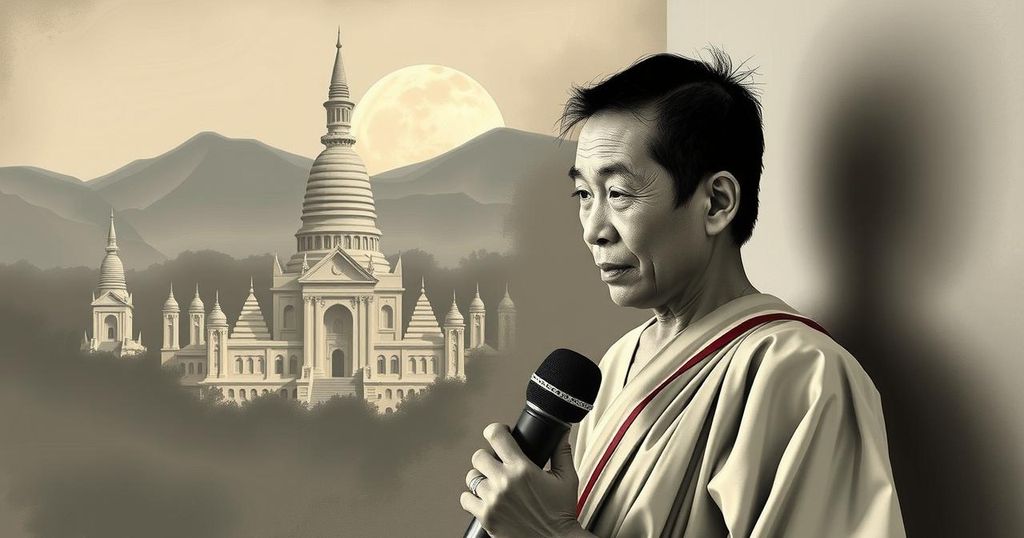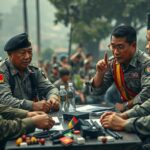Ending Myanmar’s Civil Conflict: Pathways to Resolution
Myanmar’s civil war, ignited by a 2021 military coup, has escalated under brutal junta rule, resulting in over 50,000 deaths and widespread displacement. Resistance movements have gained ground, now controlling 42% of the country, while the junta’s hold has diminished to 21%. International responses have been mixed, with sanctions proving only partially effective, leading to a need for coordinated global strategies and support for a peaceful resolution.
Myanmar has faced a deepening crisis since the military coup in February 2021, resulting in severe instability characterized by rampant violence and civil unrest. The military junta’s suppression of civilian dissent has led to over 50,000 fatalities and dislocation of three million people, exacerbating an already dire economic situation. In stark contrast, various resistance factions, including the National Unity Government (NUG) and People’s Defence Forces (PDF), have made significant inroads against military control, which has diminished to holding just 21% of the territory as of recent assessments by the BBC.
International responses to the turmoil in Myanmar have exhibited inconsistencies, with sanctions implemented by various nations aimed at pressuring the junta. In contrast, ASEAN has largely limited its engagements while China has adopted a unique stance, acting as a mediator while simultaneously maintaining relations with both the junta and ethnic groups. The military’s ongoing brutality is met with rising dissent within its ranks, with defectors and external pressures contributing to the diminishing power of the Tatmadaw.
Despite possessing considerable military might, the junta’s authority has been challenged by internal fractures, including defections from military personnel and intelligence leaks facilitated by embedded spies known as “Watermelons.” These informants provide vital information that enables resistance forces to execute strategic operations against the junta. Moreover, civilian conscription has demoralized troops, leading to a significant decline in the effectiveness of military personnel. Internal discord and high-profile defections further compromise the junta’s leadership and coherence.
On the other hand, the resistance faces significant challenges in their operations. Disparate ethnic armed groups, while crucial in undermining the junta, prioritize local autonomy, often at the expense of a unified resistance front. Urban centers, particularly Yangon and Naypyidaw, remain under tight military control, presenting considerable barriers for the resistance forces, which predominantly consist of PDFs and ethnic militias.
International efforts to mediate the crisis have yielded minimal results. Although sanctions exert pressure on the junta, they inadvertently exacerbate humanitarian conditions, leaving civilians in peril. Chinese involvement remains pivotal, focusing primarily on its regional interests rather than supporting democratic changes. Their role in recent ceasefire agreements has placated some tensions but has failed to address the conflict’s underlying issues. Simultaneously, ASEAN’s reluctance to intervene has diluted international efforts to challenge the junta’s authority.
In light of these complexities, there is an urgent need for a coordinated international response. Prioritization of humanitarian aid to resistance-controlled territories is vital in augmenting governance and infrastructure in these regions. Recognition of the NUG as Myanmar’s legitimate government would further strip legitimacy from the junta.
Another critical component is the establishment of secure channels for intelligence gathering and verification that would enhance the operational capabilities of the resistance. Offering protection and reintegration for defectors would encourage further cooperation from personnel already disillusioned with the junta. Moreover, UN-facilitated negotiations that involve the NUG, ethnic armed groups, and civil society can foster a platform for establishing a transitional government and addressing ethnic grievances.
To avert further loss of life, there is a compelling necessity to create conditions conducive to national rebuilding. Targeted sanctions should be directed squarely at the junta’s leadership rather than the civilian population to minimize humanitarian suffering. Furthermore, accountability mechanisms must hold junta leaders responsible for war crimes. Strengthening coalition dynamics within the resistance is essential for stable governance post-conflict, alongside necessary infrastructure investments in liberated territories, paving the way for a democratic Myanmar.
The ongoing civil conflict in Myanmar is rooted in a military coup that ousted the civilian government in February 2021, leading to a violent crackdown on protests and armed resistance. This turmoil has resulted in substantial loss of life, mass displacement of citizens, and a catastrophic economic downturn. Various resistance movements have emerged, notably the National Unity Government and People’s Defence Forces, which have managed to wrest control over significant portions of the country, now only 21% under military authority. Meanwhile, international engagement and responses have varied, with some actors imposing sanctions while others, notably China, pursue more strategic interests. The increasing instability and factional strife within the military highlight the urgent need for a coordinated approach to address the situation and push for political resolution.
In summary, the civil war in Myanmar presents a complex landscape marked by a weakening junta facing internal dissent and a fragmented resistance struggling for coordinated action. The necessity for international involvement and strategic support for resilience strategies cannot be overstated. By fostering diplomatic channels and supporting humanitarian initiatives, there exists a potential pathway to alleviating suffering and steering Myanmar towards a more stable and democratic future. Only through collaborative efforts can the intricacies of this conflict be managed to achieve a lasting peace.
Original Source: theowp.org








Post Comment